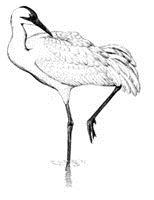North American Crane Working Group

Proceedings of the North American Crane Workshop
Date of this Version
2008
Document Type
Article
Citation
Nesbitt, S.A., M.G. Spalding, K.L. Candelora, P.S. Kubilis, and S.T. Schwikert. Body mass index (BMI) of normal sandhill cranes. In: Folk, MJ and SA Nesbitt, eds. 2008. Proceedings of the Tenth North American Crane Workshop, Feb. 7-10, 2006, Zacatecas City, Zacatecas, Mexico: North American Crane Working Group. pp. 133-137.
Abstract
We used linear and mass measurements to construct a body mass index (BMI) for 2 subspecies of sandhill cranes (Grus canadensis). We found that BMI declined during the spring and early summer period. We used the BMI to show that juvenile Florida sandhill cranes (G. c. pratensis) reach their full mass at about 270 days of age, near the age at which they begin to leave the company of their parents. We used mensural data to predict a minimum expected mass for normal sandhill cranes which could be then used to evaluate the relative health of an individual suspected of being diseased or underweight.
Included in
Behavior and Ethology Commons, Biodiversity Commons, Ornithology Commons, Population Biology Commons, Terrestrial and Aquatic Ecology Commons


Comments
Reproduced by permission of the North American Crane Working Group.